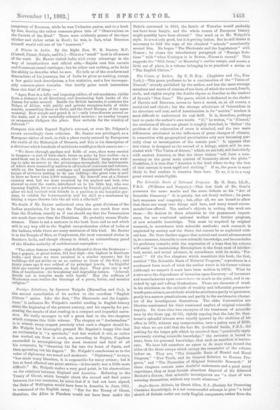Foreign Relations, by Spencer Walpole (Macmillan and Co.), is tha
second contribution of it author to the excellent "English Citizen " series. Like the firet, "The Electorate and the Legisla- ture," it indicates Mr. Walpole's careful reading in English history ;since the beginning of the present century, and his capacity for pre. .se.nting the results of that reading in a compact and impartial narra- tive. He really melanges to toll a great deal in the five chapters which compose this littlo volume. The chapter on " Ambassadors " .ia in almost every respect precisely what such a chapter should be. Mr. Walpole haa thoroughly grasped Mr. Bagehot's happy idea that an ambassador is "a spectacle," and has worked it out, or rather b.118 worked out from it much, as, according to Napier, Napoleon .succeeded in accomplishing the most immoral and fatal of all his conquests, by "thrusting hie fist into the heart of Spain, and then spreading out hia fingers." Ur. Walpole's conclusions as to the value of diplomacy are Sound and moderato. "Diplomacy," be says, "has made many blunders, it is responsible for many crimes ; but it has at least effected one great soreice,—it hoe made war a little more difficult." Mr. Walpole makes a vary good point, in his observations on the relations between England and America. Referring to the Treaty of Ghent, which brought about the second and final peace between the two countries, lw notes that if it had not been signed, the Duke of Wellington would have been in America in June, 1815, in command of the English army. "But for the Treaty of Ghent, therefore, the Allies in Flanders would not have been under the
Duke's command in 1815, the Battle of Waterloo would probably not have been fought, and the whole course of European history might possibly have been altered." One word as to Mr. Walpole's style. It is not only good, but it is getting better. But he still thinks it necessary to fold the toga of the classical " schools " occasionally around him. Ile began " The Electorate and the Legislature " with Homer ; he 'closes the introductory paragraph of "Foreign Rela- tions " with " when Ucalegon is in flames, /lenges is moved," This suggests the " fifth form," or Macaulay's earlier essays, and seems a little out of place, in a volume belonging to so practical a series as " The English Citizen."






































 Previous page
Previous page